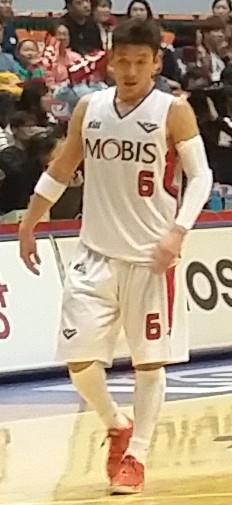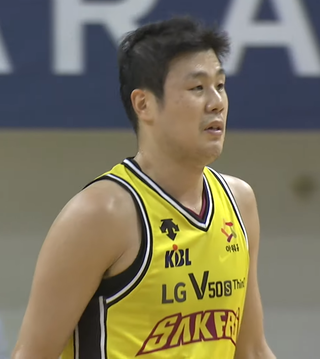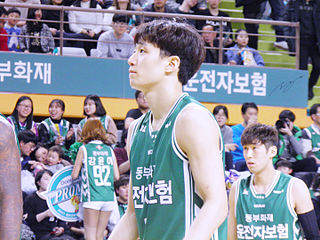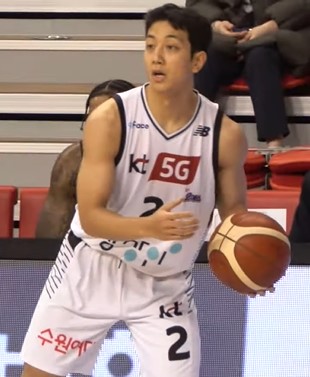Chun Hee-chul is a South Korean basketball coach and retired player. Chun is a swingman who can play in both the center and forward positions. In his prime he boasted athleticism, the ability to dunk and a mid-range jump shot which was rare for players of his height in domestic basketball at that time, earning him the nicknames "Airborne" and "Air Hee-chul".
Yang Hee-jong is a South Korean former professional basketball player.

Kyungbock High School (Korean: 경복고등학교) is one of the oldest modern secondary school in South Korea. It is located in Jongno-gu, Seoul, near Gyeongbok Palace, after which it is named. It was established on April 18, 1921. The school's original name was the No. 2 High School of Gyeongseong (경성제이고등보통학교). It has changed its name several times before settling on the name "Kyungbock" in 1938.

Yang Dong-geun is a South Korean retired basketball player for Ulsan Mobis Phoebus and the Korean national team, where he participated at the 2014 FIBA Basketball World Cup. During his sixteen-year career, he won the KBL Rookie of the Year and was named Most Valuable Player (MVP) in KBL four times. He spent his entire playing career with Ulsan Mobis Phoebus, having been at the forefront of Ulsan's dominance in the league from the early 2000's. Since retiring after the 2019-20 season, he has returned to the team as a coach.

Kim Tae-sul is a South Korean retired basketball player. During his fourteen-year professional career, Kim played for five different teams, the longest stint being at Anyang KGC where he won the KBL Championship. He was also a member of the South Korea national team and participated in the 2013 FIBA Asia Championship, 2014 FIBA Basketball World Cup and two Asian Games.

Cho Sung-min is a South Korean retired professional basketball player. He played for Busan KT Sonicboom and Changwon LG Sakers in the Korean Basketball League and was a member of the South Korean national team.
Lee Sang-min is a South Korean retired professional basketball player and basketball coach. He was part of the team at the 1994 Asian Games, 1996 Summer Olympics, 1998 Asian Games and 2002 Asian Games.
Moon Kyung-eun is a former South Korean male professional basketball player and basketball coach. He was part of the team at the 1994 Asian Games, 1996 Summer Olympics, 1998 Asian Games and the 2002 Asian Games. From 2012 to 2021 he was head coach of the Korean Basketball League team, the Seoul SK Knights.

Woo Ji-won is a South Korean retired professional basketball player. He played for three different teams over a fourteen-year career, the longest of which was spent at Ulsan Hyundai Mobis Phoebus, who retired his number 10 shirt after his retirement. He was nicknamed "Prince of the Court".

Choi Jun-yong is a South Korean basketball player for Busan KCC Egis former Seoul SK Knights and the South Korean national team.
Lee Jung-hyun is a South Korean professional basketball player for Jeonju KCC Egis in the Korean Basketball League and the South Korean national team.

Heo Ung is a South Korean professional basketball player. He plays for Busan KCC Egis in the Korean Basketball League and the South Korean national team.

Yang Hong-seok is a South Korean basketball player. He plays for Korean Basketball League team Changwon LG Sakers and the South Korean national team.
Jung Jae-kun is a South Korean retired basketball player. His playing career spanned thirteen years and coincided with the founding of the all-professional Korean Basketball League. Possessing the ability and skillset to play as either a center or a forward, he is credited with paving the way for the "center-forward" swingman to succeed in domestic basketball during an era where such players were often viewed as being strategically difficult to fit into the team's tactics.

Heo Hoon is a South Korean professional basketball player. He plays for Suwon KT Sonicboom of the Korean Basketball League and the South Korea national team.
Kang Sang-jae is a South Korean professional basketball player. He began his career with the Korean Basketball League side Incheon Electroland Elephants and is now playing for Wonju DB Promy. and the South Korea national team.

Yongsan High School (Korean: 용산고등학교) is a public high school in Yongsan, Seoul, South Korea for boys in grades 10 to 12. It is one of the few public schools in Seoul with boarding facilities.
The Korean Basketball League rookie draft is an annual event that allows teams to take turns selecting amateur basketball players and other eligible players. Eligible players attend a series of try-outs organized by the KBL roughly analogous to the NFL Scouting Combine and NBA Draft Combine, where they have their height, arm span and other measurements taken. Their predicted draft rankings are not based solely on their performances during the try-outs as players are evaluated much earlier from their performances during the U-League season, at high school tournaments or in the senior national team.
Shin Ki-sung is a South Korean retired professional basketball player and former coach. He played for three different teams in the Korean Basketball League and the South Korean national team. Known for his speed and shooting accuracy, he was nicknamed "Bullet Man".
The MBC Cup is an annual competition organized by the Korea University Basketball Federation and sponsored by broadcaster Munhwa Broadcasting Corporation (MBC). It is one of the oldest basketball competitions in South Korea for college teams and predates the U-League. In Korean-language media, it is known by its full name MBC Cup National University Basketball Championship to differentiate it from another similarly named competitions for college students in other sports.









